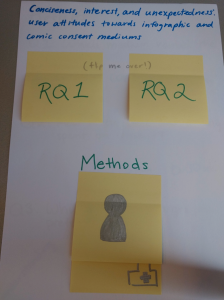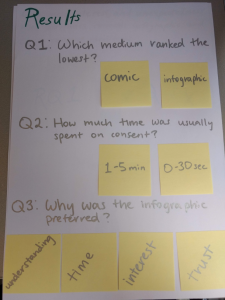ESRs share their experiences disseminating their research at CPDP
As mentioned in our previous blog post, the LeADS Project organized a dissemination and public engagement activity at CPDP. ESRs Xengie Doan and Barbara Lazarotto presented their research using creative tactics, here they share their experiences and impressions.
Xengie Doan
On Monday and Tuesday of CPDP I had the privilege to share information about the LeADS program at our booth and meet really interesting people and potential partners. On Tuesday I had dedicated 4+ hours to sharing results from my preprint, “Context, Prioritization, and Unexpectedness: Factors Influencing User Attitudes About Infographic and Comic Consent” by Xengie Doan, Annika Selzer, Arianna Rossi, Wilhemina Maria Botes, and Gabriele Lenzini in an interactive show and tell demo for any interested parties who also had the time to spare in between many interesting panels. I felt nervous about sharing a lo-fi interactive demo while the Google booth had multiple screens and very hi-fi things to show, but people were interested and receptive to the idea! I think that there is an element of touching and interacting with things that we miss going fully digital, even though you can touch screens. I was also grateful for the collective Twitter promotion I did in conjunction with Imge Ozcan and Barbara Lazarotto. I got great interactions and a good number of retweets and likes and that helped me more confidently ask if any people interested in LeADS wanted to hear a bit more about my research.
First, I shared my research questions via a prompt to flip over a paper to read the hidden text, which was the first interactive moment. Research question 1 was about research participants’ prior experiences, and research question 2 was about trying to better understand research participants’ expectations, preferences, emotions, and engaging elements of the experience by comparing different mediums of consent.

Then, I shared a short version of the methods, highlighting the number (24 German adults) and type of participants and the scenario given to participants (a data trustee is asking a participant for consent to share their email and information with a clinical trial that may be relevant for them). 
Last, I presented a short quiz session to disseminate some results. There were different questions that covered participant preferences for mediums (comics were ranked lowest based on un-seriousness for the medical context), reported time (1-5min was the most common option due to the medical consent vs. cookie consent), and elements that influenced their decisions (understanding, time and interest).
Overall, people who were interested in consent or different mediums of communication had a good time at the booth demo. I also got into interesting discussions about the issues with consent and received contacts who would be interested in reading the paper or hearing more. Personally, having to do a short interactive demo really forced me to share only the most important parts of the paper.
Barbara Lazarotto
On Monday I had the opportunity to disseminate my research and the LeADS Project at our booth at CPDP. It was a really interesting experience to develop an interactive research presentation, especially for academic purposes since it is not the most common format. I talked about my research topic which is “Public and Private Data Sharing: From dataveillance to data relevance” and developed a presentation focusing on the topic of data sharing in smart cities. First, I pushed participants to point out what words came to their minds when talking about dataveillance.
With that, we started to talk about how smart cities are the perfect opportunity to create a datafied society and how citizens are becoming disempowered. I proceeded to aske them to try to guess the market size of smart cities, to make them think about how this market is growing and the importance of discussing this subject.  I added some examples of news articles that demonstrated how smart cities can become bad for citizens if data sharing processes are not done with them in mind.
I added some examples of news articles that demonstrated how smart cities can become bad for citizens if data sharing processes are not done with them in mind.
In the end, I shared the main ideas for my research. Many participants were really interested in the topic, some expressed concern with surveillance cameras in the context of cities, and others shared that they know that many people have no idea about surveillance apparatus in their cities, however, many of them don’t know how to engage citizens in this conversation due to digital iliteracy. I also got some great feedback, and ideas for research and made some great networking with people from the field. Without a doubt, it was a very fruitful experience and I expect to create new interactive presentations in the future again.




